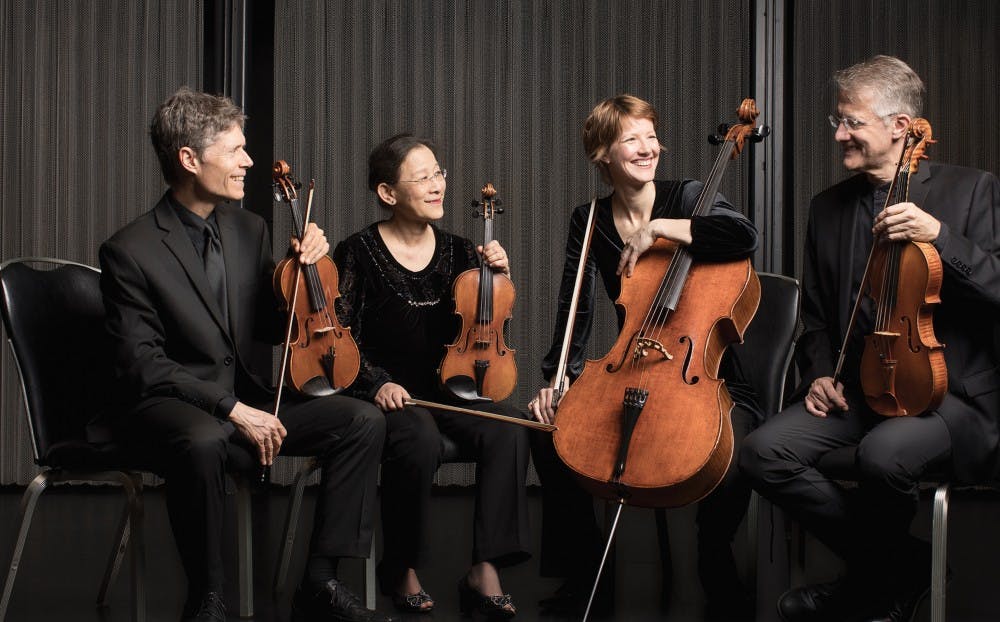The last time the Ciompi Quartet welcomed a new member, it was 1995. Nannerl Keohane had recently become the president of Duke. That fall marked the first time all freshmen roomed together on East Campus.
Now, after two decades, cellist Caroline Stinson has joined the Ciompi Quartet, Duke’s resident string quartet, after the retirement of Frederic Raimi last season.
“You have to be a great soloist, a great chamber music player and a great teacher,” violinist Hsiao-Mei Ku said.
The quartet spent last season conducting an international search, narrowing to 12 semifinalists, 4 finalists and finally choosing Stinson. Violinist Eric Pritchard said they were looking for someone who was not only an accomplished chamber musician, but also a wonderful colleague and potential mentor to students. He had been the newest member of the quartet until Stinson joined.
“I’m no longer the ‘new kid on the block,’” he said.
Violist Jonathan Bagg said Stinson introduces new energy and could raise the bar for the group.
“It will force some kinds of change in the way things operate,” Bagg said. “The good things about these changes will stick.”
Stinson, originally from Canada, taught in the Julliard and Pre-College Advancement Programs in New York before coming to Duke. She has been a member of the New York-based Lark Quartet since 2008.
She stressed the importance of flexibility in working in a quartet, particularly with new members. Working with three other people offers unique challenges in communication and appreciation of each member’s significance in the group.
“The quartet is four equal voices in conversation,” Ku said.
Italian violinist Giorgio Ciompi founded the Ciompi Quartet in 1965. All members of the quartet are Duke professors, teaching classes and performing on campus, but they have also traveled across five continents to share their music and have reached international acclaim.
The quartet celebrated their 50th anniversary three years ago, but they hope to continue to evolve.
“We want to explore what’s new in the world of music, according to what our tastes and preferences are,” Bagg said.
He feels that with the support of an institution like Duke, the quartet has the responsibility to create new chamber music. They commissioned two pieces for this season, including a piece from Scott Lindroth, Duke vice provost of the arts, that will be out in April.
Bagg said more Duke students are interested in chamber music now than when he first started teaching here in 1986, and having a quartet in residence helps inspire students to continue to pursue music at Duke. Each semester, students form eight or nine chamber music groups.
According to Ku, whether or not students choose to major in music, taking lessons in the department offers invaluable learning experience, for few other courses offer the same amount of one-on-one training.
She said the relationships formed in the music department last way beyond Duke, and that the skills students acquire can help them in their future careers, whether they become musicians, CEOs or surgeons.
“The beautiful thing about chamber music, or music in general, is that there’s no formula,” she said.
Students learn how to negotiate and communicate, how to speak up and accept criticism from working in a small chamber music group.
“That creativity takes a lot more endurance, perseverance and patience,” Ku said. “I feel that’s very important to this generation where everything happens so quickly.”
And the spirited debates disagreements can cause produce better music: Oftentimes, a musician will convince the others of the best way to play the piece not by debating, but by showing through technique.
“This is a different kind of way to bring people around to your point of view,"
Stinson said. “Much of it is done without saying anything at all.”
On the first day of class, the quartet hosted their annual performance in Pegram, where they hoped to showcase the Duke music program to freshmen. Ku is a faculty-in-residence in Pegram. In the past years President Brodhead and his wife have also attended the show.
After the performance, the quartet members mingled with and got to know the students.
“One student came up to me and said, ‘I’ve never heard chamber music sound like this,’” Ku recalled. She appreciates the ability to touch students’ lives through music, even if they aren’t musicians themselves.
The quartet’s first concert at the end of this month will be their opening concert at Duke with Stinson, but they don’t know all of what is yet to come.
“Who we are as a quartet is going to change, and we don’t know how just yet,” Bagg said.
The Ciompi Quartet will host their first concert with Stinson Sept. 29 at 8 p.m. in Baldwin Auditorium. Visit https://dukeperformances.duke.edu/events/ciompi-quartet-concert-no-1-4/ for more information.
Get The Chronicle straight to your inbox
Signup for our weekly newsletter. Cancel at any time.

